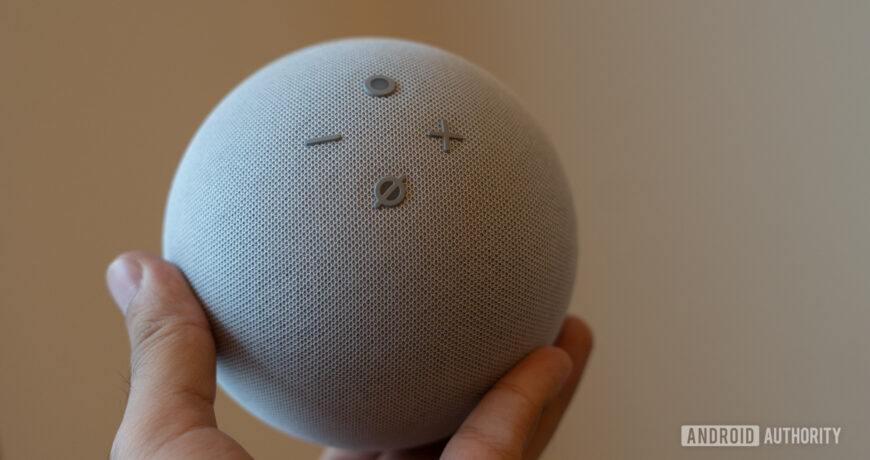How to solve common Amazon Alexa problems laissez un commentaire
[ad_1]
Dhruv Bhutani / Android AuthorityAs wonderful as smart speakers can be, they’re like any other piece of technology — sometimes they break or refuse to work the way you expect. Here’s how to solve common Amazon Alexa problems. We should note that most of these steps will apply to any speaker based on Alexa, not just Echos.
Read more: How to use Amazon Alexa
Alexa is triggering at the wrong timesAdam Molina / Android AuthorityUnless you mute them, Alexa speakers are continually listening for a wake word to accept your voice commands. By default this word is “Alexa.” It was chosen by Amazon partly because the X’s hard consonant sound is easy for Echo speakers to recognize.Occasionally, though, Alexa can be triggered accidentally. There are a few possible reasons, such as someone saying “Alexa” in a TV ad or a YouTube video. It can also misinterpret similar-sounding words, erring on the side of activating so your speaker doesn’t seem unresponsive. If there’s someone actually named Alexa among your family or friends, you’ll need to come up with a fix in a hurry.If you don’t want to mute your speaker on a regular basis, the best workaround is changing the wake word. You can do this via the Alexa app for Android, iPhone, or iPad.
Open the Alexa app, and select the More tab.
Tap Settings, then Device Settings.
Pick the speaker/display you want to change the wake word for.
Tap the gear icon in the upper-right.
Scroll down and select Wake Word.
Aside from Alexa, there are currently four options: “Echo,” “Amazon,” “Ziggy,” or “Computer.” We’d suggest “Ziggy” if you’re dealing with a lot of accidental triggers, since the other wake words can come up in regular conversation.
Related: Guide to Amazon Alexa commands
Alexa skills aren’t workingAdamya Sharma / Android AuthoritySkills are third-party creations that expand Alexa’s feature set. These can enable everything from ambient sleep sounds to music services and smart home controls.If a skill isn’t working, first check that you know how to trigger it by finding its page in Amazon’s Skills directory. You need specific phrases to make a skill work, which will be listed on its page. In fact you may need to “open” some skills before their commands can be used.When commands aren’t the issue, you may need to disable then re-enable a skill. You can do this via Amazon’s Skills directory as long as you’re signed into the same Amazon account you use for Alexa. Alternately, you can use the Alexa app:
Open the More tab.
Tap Skills & Games.
Find the skill you’re looking for under Your Skills.
Tap Settings, then Disable Skill.
Once the option appears, re-enable the skill.
If that doesn’t work immediately, you may need to restart an Alexa speaker by unplugging it, waiting a few moments, then plugging it back in.
Alexa can’t stay connected to Wi-FiWhen an Alexa speaker can’t reach the internet, it tends to complain loudly and immediately, since it depends on Amazon servers to interpret voice commands. In some cases this will be out of your hands — if there’s an internet outage in your area, you’ll have to wait for your internet service provider (ISP) to fix things. You do, however, have some options if it’s just your own modem, speaker, or local Wi-Fi network that’s behind your Alexa problems.On a basic level, you need to make sure both your Wi-Fi router and Alexa speaker are out in the open, separated by as few walls and objects as possible. Some people make the mistake of stuffing their router in a closet, drawer, or behind furniture, which reduces signal strength and range.
Drops could mean your Wi-Fi router is just oversaturated with connections.
Close proximity can improve reliability as well. If you live in a large house, or your router is on a different floor from the affected speaker, it could be that you’ll need to upgrade to a mesh router, add a Wi-Fi extender, or use two conventional routers.Before you try new hardware however, we suggest power cycling (unplugging, waiting, then plugging back in) devices in the following order: your speaker, your router, then your modem. Between each step, check to see how Wi-Fi is doing, and stop if a speaker’s internet access becomes solid. Going methodically will narrow down causes.Drops could mean your Wi-Fi router is just oversaturated with connections. Even the best routers can only handle so many devices simultaneously, and at their limit, they’ll temporarily drop one or more connections to handle others. If devices are regularly dropping from your network, try disconnecting whatever you’re not using and/or upgrading to a more capable router.
See also: Here are some possible Wi-Fi fixes
Alexa can’t understand you consistentlyJohn Callaham / Android AuthorityMost Alexa speakers are equipped with multiple microphones, and thanks to clever algorithms can often pick out your voice despite background audio. If you find yourself having to repeat commands too often, here’s what to do.First, set up a Voice ID. This not only accommodates Alexa to your accent and mannerisms, but personalizes things like calendars and reminders if you’re using it with multiple profiles. To create a Voice ID, you can tell a speaker “Alexa, get to know me,” or use the Alexa app:
Select the More tab, then Settings.
Tap Your Profile and Family.
Tap Your Profile (your name).
Select Add Your Voice.
You should also position speakers as ideally as possible. Keep them away from TVs, and make sure they’re sitting unobstructed near the places you expect to use them. A hallway bookshelf might be a convenient place to put an Echo, but if you’re talking to Alexa from a nearby room, it’s going to have trouble hearing you.
Echo alarms, timers, and notifications are too loud
This Alexa problem is Echo-specific, since other Alexa speakers may operate differently, but often you’ll find alarms, timers, and other alerts louder than a speaker’s general volume. It’s not even a problem, necessarily, since you might consider some alerts so important that you need to hear them if you’re sleeping or in another room.If you do need to reduce Echo sounds, the solution is in the Alexa app:
Select the Devices tab, then Echo & Alexa.
Choose the Echo you want to fix.
Tap the gear icon in the upper-right.
Tap Sounds.
Adjust the slider under Alarms, Timers, and Notifications.
Optionally, you can have alarms gradually increase in volume until canceled, or pick less abrasive Alarm and Notification tones.
What if I have other problems with Alexa?A common last-ditch measure is to do a factory reset of your Alexa speaker. You’ll have to go through the setup process again, and possibly update your routines as well, but there’s nothing to lose if your device wasn’t working anyway.
Read more: The best smart speakers you can buy
Comments
[ad_2]
Source link








